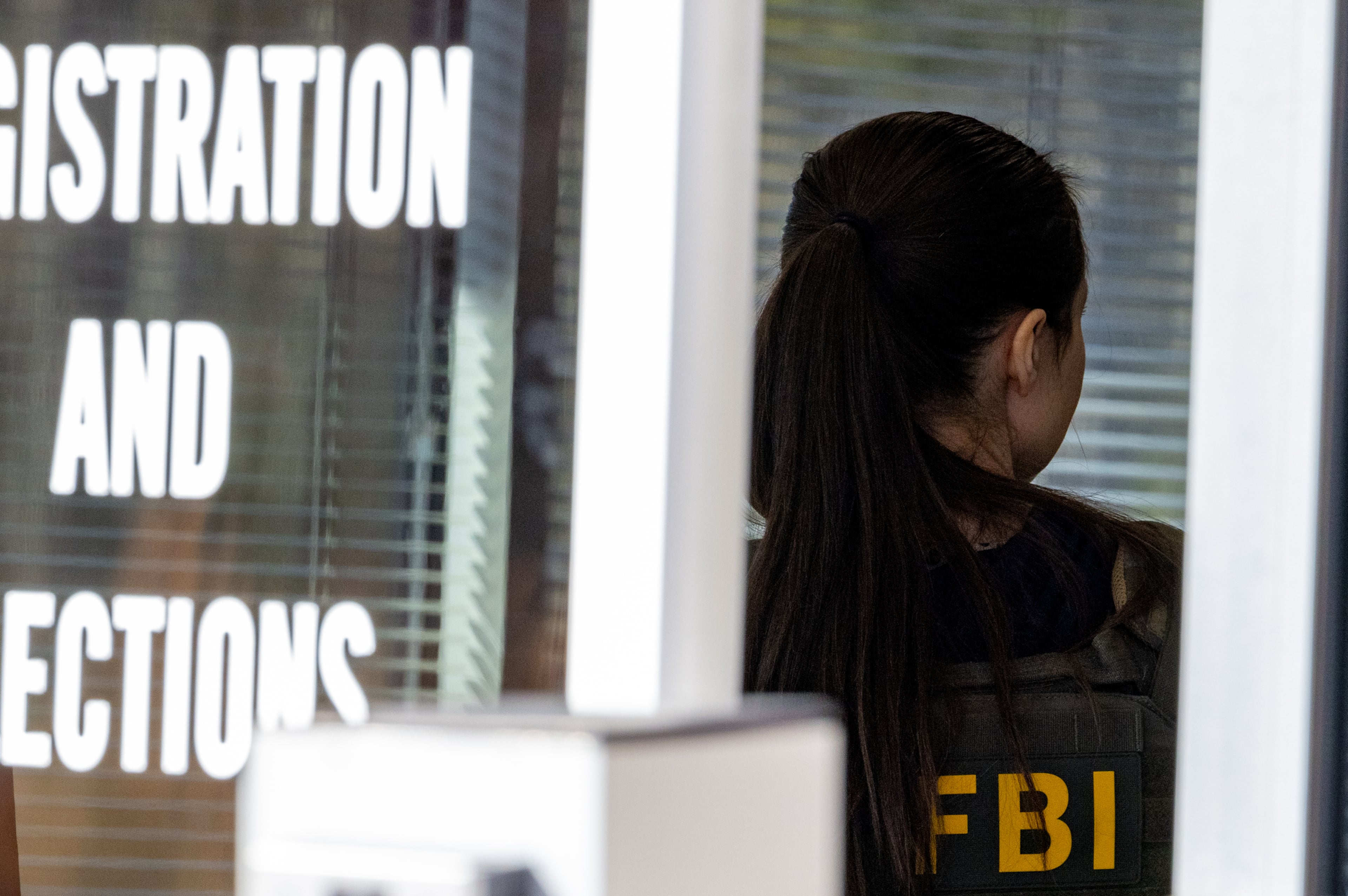Stacey Abrams has a surprising problem with Black voters

As Stacey Abrams took the stage at a recent campaign stop, one person at the crowded Atlanta event was at the top of her mind.
“Daddy, stand up,” Abrams said as her father, Robert Abrams, was showered with applause before an audience of several hundred people.
“I am not a Black man, but I’ve been raised by one,” she said, adding, “and I am always going to say that if Black men stand with me and vote for me and work with me, we can change the future of Georgia.”
That Abrams would need to hold an event designed to garner more support among Black Georgians in the final stretch of her campaign for governor is emblematic of one of the more surprising — and for Abrams, troubling — developments in the race.
In 2018, Abrams came within 55,000 votes of defeating Republican Brian Kemp thanks to a surge of votes from Black Georgians. She energized voters of color who often skipped midterms with a liberal platform and a history-making appeal to become the first Black governor in state history.
In 2022, however, the Democrat is struggling to solidify her support with African American voters she must mobilize to win the rematch.

A recent Atlanta Journal-Constitution poll underscored her difficulties, showing she has 79% of support from Black voters. While that might appear to be a lofty number, Democrats typically poll at least 10 percentage points higher with Black voters. Among Black men, Abrams’ support dips to 75%, with an additional one-fifth backing Kemp and 6% undecided.
It’s no anomaly. Other recent polls have indicated Abrams has lagging support among voters of color, and Kemp is notching double-digit backing from Black Georgians in a string of surveys released this week.
Compounding Democratic concerns, the AJC poll showed about 30% of Black voters give Kemp a positive approval rating.
“If something isn’t broken, we don’t need to try to fix it. I agree with Kemp’s policies and I like where the state is going,” said John Francois, an accountant from Upson County who is among the Black men supporting Kemp. “It’s not really about Stacey Abrams — it’s more about the governor’s agenda.”
Nor is the dynamic unique to Abrams. U.S. Sen. Raphael Warnock, the state’s first Black senator, faces similar difficulties with a November matchup against Herschel Walker, a former football star who is also Black. His campaign has followed a different strategy and hasn’t tailored events geared toward making up lost ground with voters of color.
While Abrams’ supporters can take solace that the same poll showed 10% of Black voters remain undecided — giving her an opening to expand her edge — her campaign isn’t taking this trend lightly.
“We’re coming at this in a moment of time when Black voters feel taken for granted in the Democratic Party. They worked hard to get rid of Donald Trump, and they want to know people are fighting for them,” said Lauren Groh-Wargo, Abrams’ campaign manager.
“Black voters we talk to say Stacey Abrams is different and she’s fighting for them,” Groh-Wargo said. “And we know when we talk to them, we’ll win those voters overwhelmingly. But we have to reach them.”
Abrams put it more bluntly at an August stop in Cobb County.
“If Black men vote for me,” she said, “I’ll win Georgia.”
AJC September 2022 poll
AJC poll gives Republicans the edge in most races
Interactive: Complete poll results
Podcast: Why the AJC poll is good news for Republicans
FAQ: About the AJC’s September poll
AJC poll: Abortion isn’t top issue for many Georgia voters
Biden’s policies are popular in Georgia — even if he isn’t
Opinion: Who’s up, who’s down, and what we still don’t know in the latest AJC poll
AJC Poll: Republican Burt Jones widens lead in lieutenant governor race
AJC poll: Republican incumbent Chris Carr leading in race for attorney general
PDF: View poll crosstabs
‘Problems’
The governor’s campaign has eagerly pointed out Abrams’ difficulties with Black voters — while also noting that the recent polls show her garnering about one-quarter of white support, another troubling sign for the Democrat.
“What you’re seeing is they’re having problems winning over the white Democrats that usually support them, but then they’re also having problems with Black voters that have not come home completely,” Kemp spokesman Cody Hall said Wednesday on GPB’s “Political Rewind.”
Kemp chalked up his support to conservative fiscal policies and aggressive approach to reopening the economy during the first months of the coronavirus pandemic. He often invokes a history of diverse appointments and an overhaul of the state’s citizen’s arrest law rooted in racist history.
“It’s our record. I told people from day one what I was going to do when I ran in 2018. A lot of people didn’t really know who I was then. I got defined by a candidate who had twice as much money as I did,” the governor said at a tailgate in Athens.

“I never could really fight through that,” Kemp said. “It’s a different story now because I have a great record that I think resonates with all Georgians.”
Abrams doesn’t plan to roll out policies to specifically appeal to Black voters, but instead demonstrate how she views her calls to expand Medicaid, boost teacher pay and finance need-based college scholarships by legalizing gambling can help all Georgians.
“We know that Black men can sometimes be more conservative, and it’s natural, we’re not a monolithic race — people can vote for who they want. But we should vote for what we need,” she said prior to a panel discussion alongside radio host Charlamagne tha God, rapper 21 Savage and civil rights attorney Francys Johnson.
“That is a message I think resonates with everyone, especially Black men, because when it comes down to it, this is a vital part of our electorate,” Abrams said. “And I’m not going to leave any community untouched.”
‘Early warning bell’
Abrams’ approach makes sense to Howard Franklin, a Democratic strategist who said recent polling among Black men is “not a death sentence — it’s just an early warning bell.”
Franklin said there’s always “handwringing” as November nears about whether left-leaning voters have closed ranks around a nominee.
“But I think this is probably more a question about how quickly Black men, in particular, start paying attention to this race and come to understand the stakes that are at play for November,” he said.

Emory University political scientist Andra Gillespie said the key question won’t be whether Black voters decisively back her campaign, but whether turnout among Black voters and other left-leaning demographic blocs exceeds projections.
“Democrats are approaching parity in numbers, but they have to have an exceptional turnout strategy in order to best Republicans,” Gillespie said. “They’re still the underdogs here, which means they’re going to have to work harder to win.”
‘She understands me’
At the Abrams event earlier this month, a “swag truck” emblazoned with an image of two Black children embracing the candidate dispensed campaign goodies to supporters as rap music blared in the background. Among them was a T-shirt stating: “Black men for Abrams.”
During the hourlong event, she repeatedly addressed her policy stances and criticized a wide swath of Kemp’s policies while promising to hold herself accountable in office.

For Dwight James, a 24-year-old who moved to Georgia last year, coming to this event meant building a “personal connection” with Abrams.
It’s an experience James said solidified his vote for her in November.
“Sometimes as Black men, when we see women in power, it can either be welcoming or it can be threatening, so it’s nice to know that she’s willing to be like, ‘Hey, look, I’m building this space for you all,’ ” James said. “It makes it feel like she understands me.”




